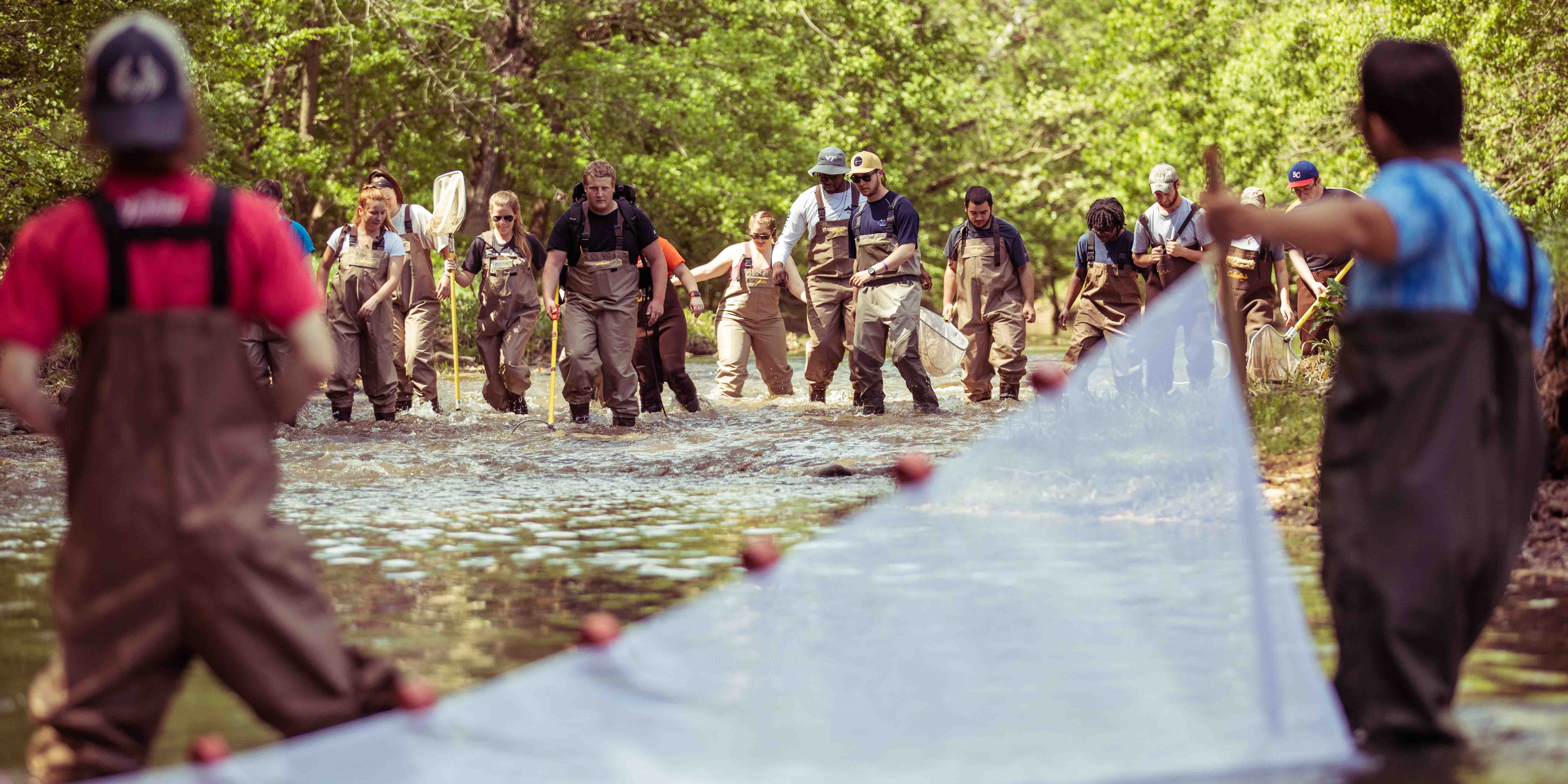Fish conservation

What is fish conservation?
The fish conservation major addresses both the scientific and human elements of aquatic ecosystem management. Areas of focus include, but are not limited to, shellfish, endangered species, aquaculture systems, and sport fish. You’ll graduate prepared to take an active role in finding new and better ways to conserve, use, and sustain the world’s vital aquatic resources. This is a very research-intensive major and provides excellent preparation for graduate school.
Learn more about this major and the Department of Fish and Wildlife Conservation.
What will I learn in this major?
Students majoring in fish conservation take courses in the following core areas: natural resources and environment, population dynamics, human dimensions of fisheries and wildlife, evolutionary biology, legal foundations, public speaking and writing, chemistry, and statistics. Additional major coursework is also required in oceanography, ichthyology, fish ecology, fish management, ecology, and geographic information systems (GIS) technology. Students have three options for specialization: freshwater fisheries conservation, marine fisheries conservation, and human dimensions.
An amazing ecosystem engineer in Soutwest Virginia
02:13
Why study fish conservation at Virginia Tech?
- The Department of Fish and Wildlife Conservation is one of the premier programs in the U.S. that focuses on fish and wildlife research, conservation, and management.
- Hands-on learning is a hallmark of the program. All students complete an experiential learning requirement by participating in one of the following: internship, research, overseas study, or independent learning.
- Classes like Ichthyology and Fisheries Techniques will take you out to local streams and other bodies of water, where you’ll gain experience with fisheries equipment and techniques by catching and releasing local species.
- Students who pursue the marine fisheries conservation option take courses in fisheries techniques and marine ecology, as well as approved courses at a collaborating institution. Students have completed their coursework at institutions such as the University of North Carolina-Wilmington, Coastal Carolina University, Dauphin Island Sea Laboratory (affiliated with the University of South Alabama), University of Washington, and Stony Brook University.
- You’ll learn from faculty like Holly Kindsvater, who has studied the impact of fisheries management on shark populations, and Emmanuel Frimpong, an expert on the bluehead chub, a minnow found in Southwest Virginia whose nest-building secrets may be the key to conserving other threatened species that use the nests for spawning and protection.
- Partnerships with federal agencies, as well as Virginia Tech’s Global Change Center and the Freshwater Mollusk Conservation Center, afford students and faculty opportunities to conduct research, join project teams, and solve resource management problems.
- You might be interested in a CNRE or integrated Pathways minor that will provide you with additional subject matter expertise, allow you to pursue a passion, and help you stand out in the job market.
- Student organizations like the American Fisheries Society Student Chapter, which plans and holds the Annual Mudbass Tournament for local children and families, provide opportunities to make connections and get involved on campus and in the community.
What can I do with a degree in fish conservation?
Graduates in fish conservation may enter the job market or pursue a graduate degree in the field. Career possibilities are listed below, and potential employers include conservation nonprofits, environmental consulting firms, fish hatcheries, national and state parks, U.S. Department of Agriculture, U.S. Fish and Wildlife Service, and Virginia Department of Wildlife Resources.
- Animal caretaker — Feeds and raises fish in aquaculture facilities, hatcheries, or other settings.
- Aquaculturist — Grows fish for food markets and for fisheries agencies, producing fish to enhance recreational fisheries and threatened populations.
- Biological science technician/fishery technician/wetland technician — Carries out the practical tasks and procedures essential to completing plans and projects: manages habitats, conducts surveys or experiments, and computes and records data.
- Environmental consultant — Conducts viability and impact assessments to determine the effects that proposed land and water developments might have on plant and animal life.
- Environmental educator/conservation education specialist — Educates learners of all ages about natural resources and the environment.
- Fish culturist/hatchery manager — Manages fish hatcheries, propagates various species of hatchery fish, and implements fish disease control programs.
- Fisheries biologist — Studies the life history, habitats, population dynamics, nutrition, and diseases of fish, and plans and carries out fish conservation and management programs.
- Fishing and hunting guide — Leads fishing and hunting trips or expeditions.
- Game warden — Protects wildlife and the environment through law enforcement and conservation activities.
- Museum collections manager — Cares for and maintains museum fish specimens.
- Public affairs specialist — Works with the news media and the public to provide information about natural resources.
- Research fisheries biologist — Gathers data on the effects of natural and human environmental changes on fish, and restores and enhances fish habitats.

Attend a CNRE interest session
as part of your campus visit

Apply for admission
if CNRE is your place

Ask questions and connect
with our recruiter, John Gray Williams



